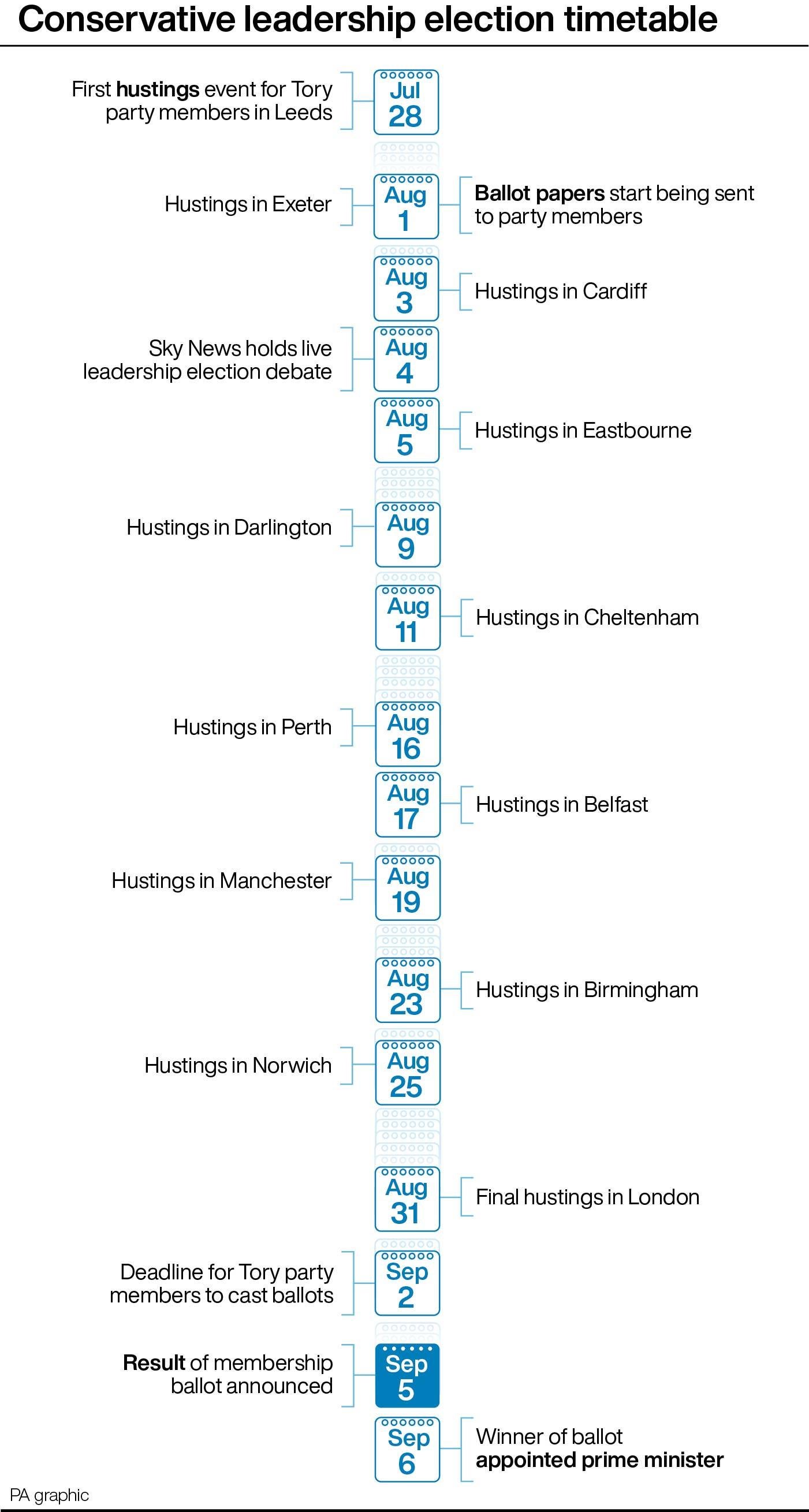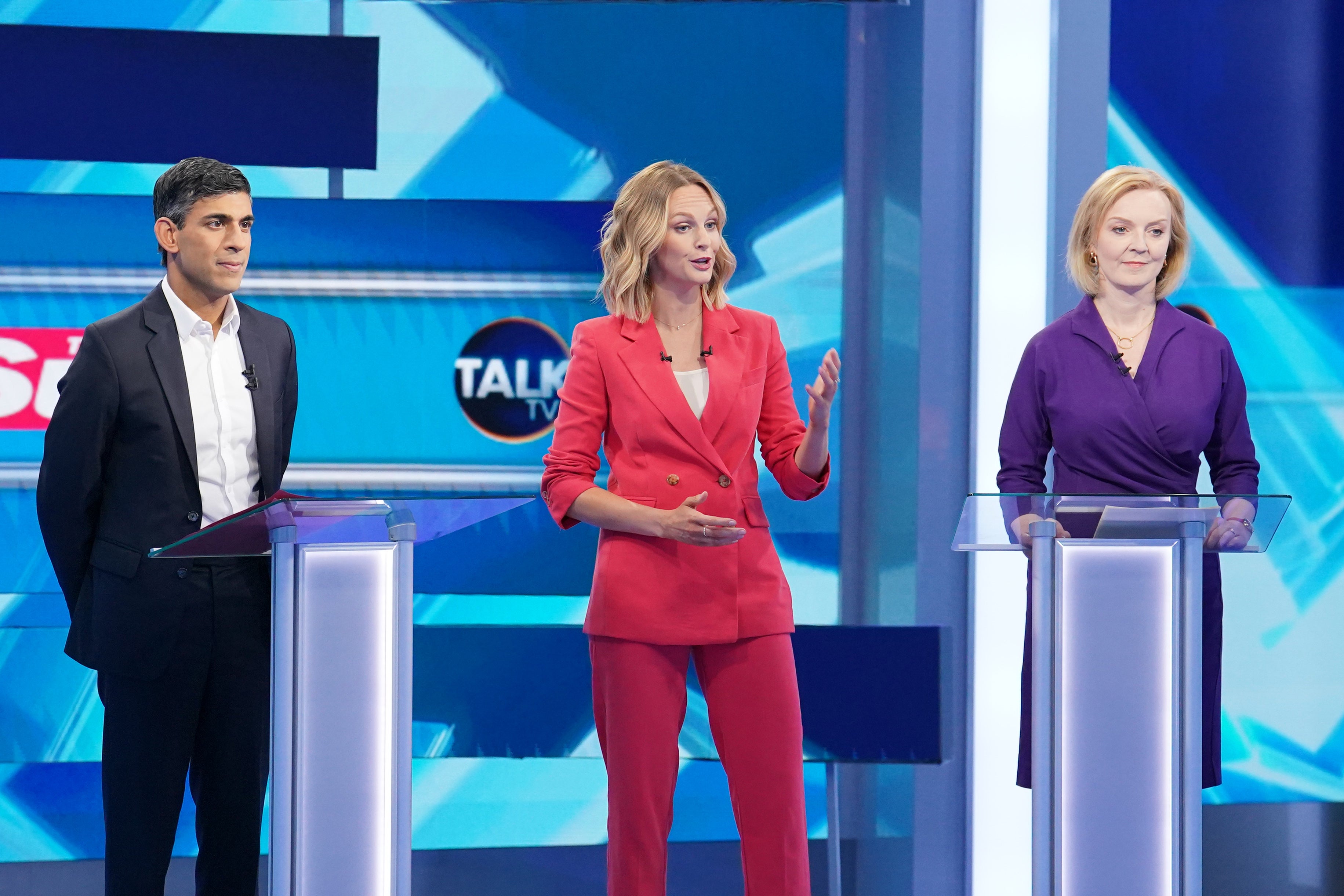
Rishi Sunak has come under fire for “flip-flopping” on tax after pledging to cut VAT on energy bills and for interrupting his rival Liz Truss in Tory leadership debates.
It came after the former chancellor unveiled plans to remove VAT from domestic energy bills for a year if the price cap – currently just under £2,000 a year for the average home – exceeds £3,000 as is forecast by experts.
Ms Truss’s campaign declared it a “screeching U-turn” after Mr Sunak has repeatedly branded her tax-cutting plans as “comforting fairytales” throughout the contest, which has been dominated by bitter clashes over taxation.
Business Secretary Kwasi Kwarteng, a senior ally of Ms Truss, said Mr Sunak’s U-turn and handling of the TV debates were a sign he is under “a lot of pressure” in the race for No 10.
Mr Kwarteng told Times Radio: “That’s why we see all these statements: he was the person who said the VAT cut would disproportionately benefit rich families and now he’s saying that a VAT cut on energy bills is the right thing.
“He was saying that tax cuts were a fairytale, now he is proposing an unfunded tax cut.
“There comes a time in campaigns when people are under a lot of pressure, he clearly felt under a lot of pressure in the debate and he wanted to get out on the front foot and interrupt Liz.
“I think that was the wrong look for him, I think that was the wrong action, but I can understand why he did that”.
Asked whether Mr Sunak could win a general election, Mr Kwarteng told LBC radio: “He has flip-flopped and U-turned on this tax issue, which I find somewhat concerning, but he is a capable politician and a very likeable chap”.
Criticism also came from the opposition, with Shadow Treasury Minister Pat McFadden accusing him of “acting as his own personal rebuttal unit” and Liberal Democrat Treasury spokesperson Sarah Olney saying “this sounds like another Sunak Swindle”.
The Institute for Fiscal Studies (IFS) said the policy would primarily benefit people with large houses and energy bills, but not the poorest.
“By providing more support to those whose use more energy, it would be well targeted at those who face the biggest rise in their energy bills, but not at those – the poorest – who are least able to cope with the rise in costs,” Stuart Adam, a senior IFS economist, said.
Mr Sunak rejected calls in February for a VAT cut to energy bills, telling the Commons “there would be no guarantee that suppliers would pass on the discounts to all customers”.
But the former chancellor’s campaign team said his new “winter plan” to tackle inflation and the cost-of-living crisis stands in contrast to the inflationary £55 billion of fiscal commitments Ms Truss has made.

Transport Secretary Grant Shapps, a supporter of Mr Sunak, defended Mr Sunak’s £4.3 billion policy as sensible as it would not add to inflation.
“In the short term it would be deflationary because people’s costs would reduce, in the medium term it would not have an impact on the consumer prices index,” he told ITV’s Good Morning Britain.
Put to him that it is a “flip-flop”, Mr Shapps said: “If he hadn’t produced £37 billion of support, about £1,200 to the hardest-up households already – if he hadn’t done any of that and then suddenly did it, then you would have a point.
“But he has, he has been providing all this support, now he is saying: ‘Here’s something that won’t add to inflation that would save every person watching your programme £160 off their energy bills’ – I think that’s worthwhile.”

Mr Sunak said about his proposals: “This additional VAT cut will help deal with the current emergency.
“I will also begin undertaking major supply side reforms targeted at the rising cost pressures families are facing.
“That means urgently getting more people off welfare and into work and tackling the supply chain crunch”.
A source from Ms Truss’s campaign said: “It’s good that Rishi has finally woken up and decided to offer something to people struggling with the rising cost of living.
“However, this feels like a screeching U-turn from someone who has spent the last few weeks of the leadership campaign branding everyone else’s tax cuts immoral and fairytales”.
VAT was not the only issue over which Mr Sunak was accused of a U-turn, with Work and Pensions Secretary Therese Coffey saying he had blocked her plans to help people on benefits get better jobs by increasing the number of hours they have to work.
As part of his proposals, Mr Sunak would expand the labour force by tightening up the rules on out-of-work benefits, doubling the number of hours someone on welfare has to work a week in order to avoid having to look for a full-time job.
Ms Coffey, a backer of Ms Truss, said: “DWP (Department for Work and Pensions) will shortly change the rules to ensure people keep looking for extra work until they have at least 12 hours a week, with an ambition to increase that in the future.
“DWP had hoped to get this under way earlier this year, but unfortunately were blocked by the former chancellor.”
Ms Truss’s promises of vast tax cuts have helped her come out ahead in opinion polls and member surveys.
During Tuesday night’s TalkTV/Sun debate, which was halted after host Kate McCann fainted live on air, Ms Truss said it was “morally wrong” to raise taxes during a cost-of-living crisis, but the former chancellor hit back by saying it was “morally wrong” to heap more debt on future generations.
The two also clashed over the rise in national insurance, brought in to help pay for the NHS and social care, with the former chancellor describing himself as “brave” for introducing the £12 billion tax increase.







